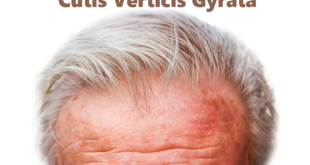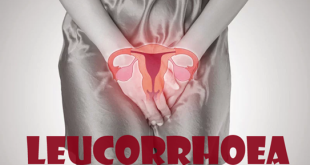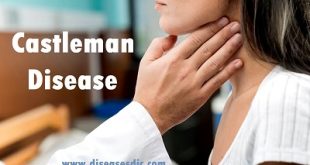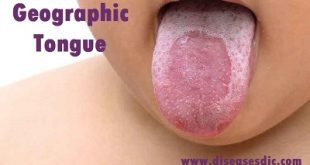Definition
A canker sore, or aphthous ulcer, is an open and painful mouth ulcer or sore. It’s also the most common type of mouth ulcer. Some people notice them inside their lips or cheeks. They’re usually white or yellow and surrounded by red, inflamed soft tissue. Since canker sores are not caused by a bacteria or virus, they cannot be spread from one person to another. The most common sores are 1/8” to 1/4“in diameter, although so-called “major” ulcers may be 1/2” or larger.
Canker sores often run in families. They also are linked with other diseases, including Behcet’s syndrome. You may have only one canker sore at a time, or many of them all at once. Most people get one, two or three sores at a time. But some people have 10 or more at a time. People who get canker sores typically have them a few times each year. Canker sores are not contagious.
Canker sores in the lip
Types of canker sores
- Minor apthae – these are usually small ulcers (less than 1cm in diameter) and appear as single or multiple ulcers (1 to 5) on the underside of the tongue, floor of mouth or inside lining of the cheek. They heal spontaneously within 7 to 10 days.
- Major apthae – these ulcers are less common and present more severely compared to minor apthae. They present as small clusters of ulcers, slightly larger on diameter compared to minor aphthae. They occur in larger numbers (1 to 10) and can be found on lips, soft palate and throat. They can be present for weeks to months causing severe discomfort and pain during swallowing.
- Herpetiform – these are the least common and appear as small clusters 2-3mm in diameter and 10-100 in number. They last for around 7 to 30 days and can cause scarring.
Epidemiology of Canker sores
Canker sores are one of the most common oral irritations, and it has been estimated that somewhere between 20% and 60% of the population have had canker sores at one time or another. These lesions affect all age groups, but people in their teens and 20’s are more likely to develop them. Women are more prone to suffer from canker sores than men. Canker sores may also run in families but they are not contagious.
Causes of canker sore
- Stress
- Nutritional deficiencies such as Vits B1, B6, B12, zinc or iron
- Allergies
- Eating certain acidic foods – strawberries, citrus fruits, tomatoes
Risk factors and complications included
There are a number of different risk factors that can play a role (either alone or in combination) in triggering canker sore outbreaks. They include:
Mechanical trauma
A canker sore’s formation is often preceded by some type of tissue damage. This might be an accidental self-inflicted bite, irritation caused by the sharp edge of a tooth that needs repair, trauma from food (like a crisp chip) or even just overenthusiastic tooth brushing.
Psychological stress
- Many people find that their outbreaks coincide with periods of emotional stress (this can even include normal day-to-day types of events that tend to wear us down from time to time).
- As evidence of this correlation, researchers have found that patients who have psychological disorders tend to have a higher incidence rate of aphthous ulcers. So do people who have genetic conditions that cause increased anxiety traits.
Dietary issues
Canker sore outbreaks may be associated with nutritional deficiencies. Some of the vitamins and nutrients thought to be involved are:
- Vitamin deficiencies: B1 (thiamine deficiency), B2 (riboflavin deficiency), B6 (pyridoxine deficiency), B12 (pernicious anemia), C
- Nutrient deficiencies: zinc, folic acid, iron, selenium, calcium
Food allergies
Sensitivities to some foods (as well as some other substances) seem to be triggers for outbreaks. These items include:
- Cereal grains: buckwheat, wheat, oats, rye, barley, the gluten protein found in grains
- Fruits and vegetables: lemons, oranges, pineapples, apples, figs, tomatoes, strawberries, eggplant
- Dairy: milk, cheeses
- Other foods: nuts (walnuts), peanuts, almonds, chocolate, shellfish, soy, vinegar, French mustard, tea, coffee, cola
- Additives: cinnamonaldehyde / cinnamon oil (a flavoring agent), benzoic acid (a preservative)
- Other substances: toothpastes, mints, gums, dental materials, metals, medications
Sodium lauryl sulfate (SLS):
- Some studies have suggested that products that contain sodium lauryl sulfate (“SLS”), a foaming agent found in most toothpaste and mouthwash formulations, may place a person at increased risk for canker sore break outs.
If your canker sore is left untreated for a few weeks or more, you may experience other, more serious complications, such as:
- Discomfort or pain while talking, brushing your teeth, or eating
- Fatigue
- Sores spreading outside of your mouth
- Fever
- Cellulitis
How to diagnose and Test canker sore
Tests aren’t needed to diagnose canker sores. Your doctor or dentist can identify them with a visual exam. In some cases, you may have tests to check for other health problems, especially if your canker sores are severe and ongoing.
How to treat canker sore
Minor apthae usually self-resolve within 7 to 10 days however, some products can be used to provide temporary relief of pain.
- Topical anesthetics like benzocaine or lidocaine (Orajel, Zilactin B) can be applied to the ulcer using a Q-tip 4 times a day before meals and at bedtime for up to 1 week. These products only provide short-term relief lasting for around 30 mins.
- Oral anesthetics – Acetaminophen (Tylenol) is recommended for pain relief and should be dosed according to the dosing instructions on the label. In any case, the maximum recommended dose should not be exceeded. Anti-inflammatory pain relievers like Ibuprofen (Advil), Naproxen (Aleve) or Aspirin should be avoided since they may worsen the ulcers.
- Protectants – using topical products with hydroxypropyl cellulose or carboxymethylcellulose (Orabase paste) can provide temporary pain relief by forming a barrier over the ulcer and preventing irritation.
- You may try an over-the-counter topical pain reliever like Anbesol, or your medical provider may prescribe a prescription anesthetic agent in certain cases.
- You can mix equal amounts of Milk of Magnesia and Benadryl (diphenhydramine) Allergy liquid. After it is mixed, you can swish a teaspoonful in your mouth for about one minute and then spit it out. If you do this every 4 to 6 hours, your canker sore may hurt less.
- Advil (ibuprofen) 200mg 2 tabs by mouth every 4-6 hours or Tylenol (acetaminophen) 325mg 2 tabs every 4-6 hours may be used as needed.
- Over-the-counter cleansing agents such as Glyoxide may also be used or simple rinses with mild salt water or other commercial mouthwashes.
- Be careful not to irritate the sore with sharp food (e.g. tortilla chips) or toothbrushes, and avoid very spicy or citrus foods which may increase pain.
Prevention of Canker sore
Since stress is one of the causes of canker sores, relaxation and stress reduction can significantly reduce occurrence
- Detecting nutritional deficiencies and replenishing them with diet or supplements
- Avoiding acidic foods if that is identified as one of the potential causes of canker sores
- Avoid harsh toothpastes containing sodium lauryl sulfate
- Maintain regular daily hygiene – Brush twice daily and floss teeth daily
- Canker sores can be cleansed by rinsing the mouth with salt and water (2.5 – 5mL salt in 250mL of warm water) several times a day especially after meals
- Don’t use mouth washes that have high alcohol content while you have ulcers in your mouth since it could cause stinging
- Avoid salty, spicy, acidic and hard food since they could worsen the canker sore pain
 Diseases Treatments Dictionary This is complete solution to read all diseases treatments Which covers Prevention, Causes, Symptoms, Medical Terms, Drugs, Prescription, Natural Remedies with cures and Treatments. Most of the common diseases were listed in names, split with categories.
Diseases Treatments Dictionary This is complete solution to read all diseases treatments Which covers Prevention, Causes, Symptoms, Medical Terms, Drugs, Prescription, Natural Remedies with cures and Treatments. Most of the common diseases were listed in names, split with categories.








very good it help a lot
Very good help full
Help full
which drug is use to treat canker sores
Read the treatments given in the post.
which medicines will complete end that disease.
Please follow the treatment mentioned on the post with a help from practitioner.
it help, I had such problem a certain doctor convince me to go & test for AIDS while not! thankyou lots!
Am enjoying this app since it is teaching me so many things that I don’t know.
Thanks,really helpful
tell us wht kind of medicine or tablet which i cn use on that diesease.or illness.
please consult a doctor to get rid of this problem.
can it be one of HIV signs?and can canker sore be filled with fluid like ?
Canker sores aren’t a symptom of HIV, but having HIV can increase the risk for recurring and severe sores. Other factors that can cause canker sores include stress, acidic foods, and mineral deficiencies that include: iron.